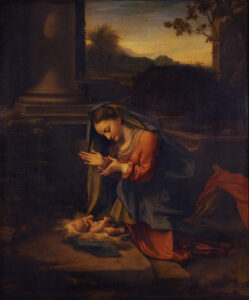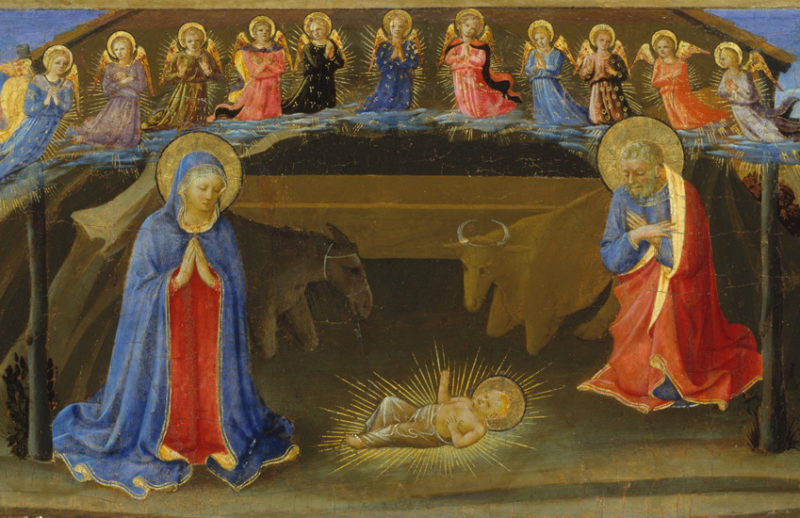“Puer natus est nobis, et fílius datus est nobis:
cujus impérium super húmerum ejus.”
A Child is born to us, and a Son is given to us:
whose government is upon His shoulder.
Grant, we beseech Thee, almighty God, that the new birth of Thine only-begotten Son in the flesh may set us free, who are held by the old bondage under the yoke of sin.
– Christmas Introit and Collect
LINK to a Merry Christmas Video Message from The Fatima Center (2023).
The Nativity of Our Lord and Savior Jesus Christ
by Fr. Alban Butler
When all things were accomplished which according to the ancient prophets were to precede the coming of the Messias, Jesus Christ, the eternal Son of God, having taken human flesh in the womb of the Virgin Mary and being made man, was born of Her for the redemption of mankind.
The all-wise and all-merciful providence of God had, from the fall of our first parents, gradually disposed all things for the fulfilling of His promises and the accomplishing of the greatest of His mysteries, the Incarnation of His divine Son. A decree had been issued by the Emperor Augustus ordaining that all persons should be registered at certain places, according to their respective provinces, cities and families. This decree was an occasion for the manifestation to the whole world that Christ was a descendant of the house of David and tribe of Juda, for those of that family were ordered to be registered at Bethlehem, a small town in the tribe of Juda, six miles from Jerusalem to the south.
Bethlehem had been David’s home, and Joseph and Mary had come thither from Nazareth, fifty-six miles north from Jerusalem. The Prophet Micheas had foretold that Bethlehem-Ephrata (i.e. the fruitful house of bread) should be ennobled by the birth of “the ruler in Israel,” Christ. Mary therefore undertook this tedious journey with Her husband, in obedience to the emperor’s order for their enrolment in that city.
After a slow journey through mountainous country they arrived at Bethlehem, and there found the public inns already full; nor were they able to get any lodgings at all. In this distress they at last went into a cavern in the side of the ridge whereon Bethlehem is built, which was used as a stable. A tradition dating back to at least the Fifth Century maintains that an ox and an ass were in it at the time (which is supported by Isaias 1:3, “The ox knoweth his owner and the ass his master’s crib.”)
In this place the Mother, when Her time was come, brought forth Her divine Son, wrapped Him in swaddling clothes, and laid Him in the manger.
God was pleased that His Son, though born on earth in obscurity and poverty, should be at once acknowledged by men and receive the first fruits of their homage and devotion. But the great ones of the world, the wise among the Jews and Gentiles, the elders and princes, who seemed raised above the level of their fellows, are passed over. Certain shepherds were at the time keeping the watches of the night over their flock. To them an angel appeared, upon which they saw themselves surrounded with a great light, and they were suddenly seized with fear.
But the angel said to them: “Fear not! For behold I bring you good tidings of great joy, that shall be to all the people. For this day is born to you a Savior, Who is Christ the Lord, in the city of David. And this shall be a sign unto you: you shall find the Infant wrapped in swaddling clothes and laid in a manger.”
And there appeared with the angel a multitude of heavenly spirits, praising God and saying, “Glory to God in the highest, and on earth peace to men of good will!”
Then the wondering shepherds said to one another, “Let us go over to Bethlehem, and let us see this word that is come to pass, which the Lord hath shewed to us.” They hastened thither, and found Mary and Joseph, and the Infant lying in the manger. “And, seeing, they understood of the word that had been spoken to them concerning this Child. And all that heard wondered at those things that were told them by the shepherds. But Mary kept all these words, pondering them in Her heart.”
Then they did homage to the Messias as to the spiritual king of men, and returned to their flocks glorifying and praising God.
The message delivered by the angel to those shepherds is addressed also to us, “to all the people.” By them we are invited to worship our new-born Savior; and our hearts must be insensible to all spiritual things if they are not filled with joy at the consideration of the divine goodness and mercy manifested in the Incarnation, the coming of the promised Messias.
The thought and foreknowledge of this mystery comforted Adam in his banishment; the promise of it sweetened the pilgrimage of Abraham; it encouraged Jacob to dread no adversity, and Moses to brave all dangers and conquer all difficulties in delivering the Israelites from Egyptian slavery. All the prophets saw it in spirit with Abraham, and they rejoiced.
If the expectation gave the patriarchs such joy, how much more ought the accomplishment give to us. “The letter of a friend,” says St. Peter Chrysologus, “is comforting, but his presence is much more welcome; a bond is useful, but the payment more so; blossoms are pleasing, but only till the fruit appears. The ancient fathers received God’s letters, we enjoy His presence; they had the promise, we the accomplishment; they the bond, we the payment.”
Love is the tribute which God asks of us in a particular manner in this mystery; this is the return for all He has done and suffered for us. He says to us, “Son, give Me thy heart.” To love Him is our sovereign happiness and the highest dignity of a human creature.

Christ’s life is the Gospel reduced to practice. He instructs us at His very Birth, beginning first to practice, then to preach. The manger was His first pulpit, and from it He teaches us the cure of our spiritual maladies. He came among us to seek our miseries, our poverty, our humiliation, to repair the dishonor our pride had offered to the Godhead, and to apply a remedy to our souls.
And He chose a poor Mother, a little town, a stable. He Who adorns the world and clothes the lilies of the field beyond the majesty of Solomon is wrapped in rude cloth and laid in a manger. This He chose to be the very sign of His identity. “This shall be a sign to you,” said the angel to the shepherds. “You shall find the Child wrapped in swaddling clothes and laid in a manger.” It is a powerful instruction.
“The grace of God our Savior hath appeared to all men, instructing us,” says the Apostle – all men, the rich and the poor, the great and the small, all who desire to share His grace and His kingdom, instructing us in the first place in humility. What is the whole mystery of the Incarnation but the most astonishing humbling of the Deity?
To expiate our pride the eternal Son of God divests Himself of His glory and takes the form of man in his every circumstance – save sin. Who would not think that the whole creation would be overwhelmed with the glory of His presence and tremble before Him? But nothing of this was seen. “He came not,” says St. John Chrysostom,
“so as to shake the world at the presence of majesty; not in thunder and lightning as on Sinai: but He came quietly, no man knowing it.”




